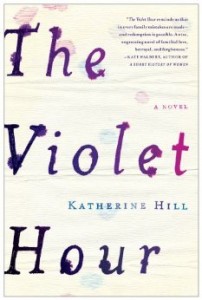Book Review
 Though reductive and imperfect, it’s not so inaccurate to describe good fiction as the conscientious charting of interesting mistakes. By that metric, Katherine Hill’s debut novel, The Violet Hour, succeeds in nearly every measure.
Though reductive and imperfect, it’s not so inaccurate to describe good fiction as the conscientious charting of interesting mistakes. By that metric, Katherine Hill’s debut novel, The Violet Hour, succeeds in nearly every measure.
Set in the aftermath of an unexpected family death, the novel follows Abe and Cassandra Green, a divorced couple whose sad, fractured story is told through flashback: their affecting courtship at a public health clinic, their marriage, Cassandra’s infidelity and Abe’s inattentiveness, the birth of their daughter Elizabeth, and, eventually, the explosive end of their relationship.
It’s here—the dramatic end of the marriage—that Hill opens the novel, set aboard Abe’s coveted boat, with the whole family out for a sail in the San Francisco Bay. Abe accuses Cassandra, accurately, of sleeping with someone else, and a shouting match, wisely summarized by Hill, ensues. Bereft and unsure what else to do, Abe dives from the boat. The novel that follows reads as a post-mortem of the relationship since their marriage is, with no small amount of finality, over. Not accidentally, of course, the reader comes to learn that Cassandra’s family is in the mortuary business, and the theme of examining something after it’s already died—and making it presentable, for better or worse—is strengthened. There’s sadness in knowing it’s over when reading those early scenes of Abe and Cassandra’s love, but the scenes become more valuable for it. They weigh more. Without ever resorting to being maudlin, Hill ensures that, as in life, pain accompanies anything happy.
No one here, it should be noted, is terribly likeable. Cassandra cheats on Abe knowing full well what she is doing, and Abe seems more interested in advancing his career as a doctor and getting high (curiously, these never seem to be much in conflict) than mending a relationship that, for all its faults, the reader understands is good for him. Even their daughter, Elizabeth, the other main point-of-view character here, seems mercurial and disconcertingly status-driven. Likeable characters aren’t a requirement for good fiction, of course—more often than not they handicap it—but any hopes of finding someone to root for are often dashed. But even here, in this potential drawback, Hill succeeds again, finding more value in portraying life the way it is, instead of the way we so often wish it would be.
It doesn’t hurt that Hill, Colorado Review’s 2010 Nelligan Prize winner, is gifted at concise, affecting description. Take, for instance, Hill’s portrayal of Toby Steinberg, the novel’s one character outside the immediate family and, for that reason, its most unpredictable: “He lived in a grim studio with six guitars and a yellowish refrigerator that smelled of foods he’d never kept. . . . He had notebook upon notebook of ideas, enough for a lifetime of work, and he kept at it, because that’s what everyone said to do. Yet so far, he hadn’t managed to find anyone to listen.” Hill consistently hits notes like these, and the story of this family—at once alien and familiar, pitiable and impressive—is rendered with candor and economy. In short, Hill’s voice is one that can carry the weight of an emotionally complex novel such as The Violet Hour, and readers will be anxious to read more from her.
